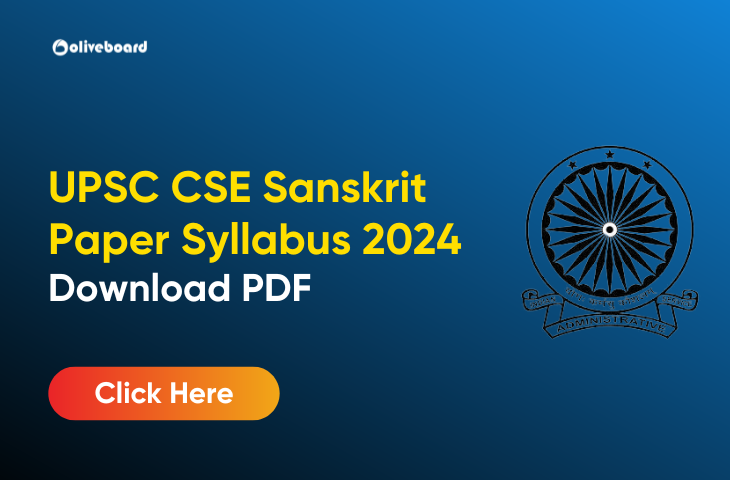UPSC Sanskrit Syllabus 2024
The UPSC Sanskrit syllabus in 2024 will evaluate candidates on their proficiency in the language. The exam pattern will remain similar to previous years. Aspirants will be tested on comprehension of Sanskrit passages, both long and short, covering diverse themes including literary, philosophical, scientific and social topics. Their knowledge of Sanskrit grammar, vocabulary, syntax and ability to translate passages will also be assessed.
You can download the UPSC CSE Sanskrit Optional language paper syllabus from the direct link given below.
UPSC Sanskrit Syllabus 2024 Overview
As the ancient classical language of India, Sanskrit has a rich literary heritage covering epics, scientific works and philosophy. Despite limited contemporary usage, Sanskrit is offered as an optional UPSC subject across two papers assessing proficiency in grammar, vocabulary, comprehension, translation and analysis of seminal texts.
Sanskrit Literature Syllabus for UPSC CSE 2024
The specialized Sanskrit language is recommended as an optional only for candidates with formal Sanskrit education. The UPSC syllabus across two papers specifies answering some questions in Sanskrit using Devanagari script, and others in the chosen exam medium. It evaluates grammar, vocabulary, comprehension, translation and analysis of key Sanskrit texts.
If you opt for Sanskrit language as optional in UPSC mains, prepare it thoroughly. Go through the UPSC CSE Syllabus and previous years’ Sanskrit papers. The CSE Mains includes two test papers on the optional subject selected by the candidate, each for 250 marks.
UPSC CSE Sanskrit Syllabus 2024 for Paper 1
There will be three questions as indicated in the Question Paper which must be answered in Sanskrit. The Remaining questions must be answered either in Sanskrit or in the medium of examination opted by the candidate.
Section A
- Significant features of Sanskrit grammar (to be answered in Sanskrit):
- शब्दरूपं संज्ञा, सन्धि, कारक, समास, कर्तरि और कर्मणि वाच्याः इत्यादि।
- Characteristics of Vedic and Classical Sanskrit:
- Main characteristics of Vedic Sanskrit language b. Prominent features of classical Sanskrit language
- Contribution of Sanskrit to linguistic studies
- General Knowledge:
- Literary history of Sanskrit
- Principal trends of literary criticism
- Ramayana
- Mahabharata
- Origin and development of literary genres such as Mahakavya, Rupaka (drama), Katha, Akhyayika, Campu, Khandakavya, and Muktaka Kavya.
Section B
1. Essentials of Indian Culture:
- Purusarthas
- Samskaras
- Varnashramavyavastha
- Arts and fine arts
- Technical Sciences
2. Trends of Indian Philosophy:
- Mimamsa
- Vedanta
- Nyaya
- Vaisheshika
- Samkhya
- Yoga
- Buddha
- Jaina
- Charvaka
3. Short Essay (in Sanskrit)
4. Unseen passage with questions (to be answered in Sanskrit)
UPSC CSE Sanskrit Syllabus 2024 for Paper 2
Question from Group 4 is to be answered in Sanskrit only. Questions from Groups 1, 2 and 3 are to be answered either in Sanskrit or in the medium opted by the candidate.
Section A
Group 1:
- Raghuvamsam by Kalidasa
- Kumarasambhavam by Kalidasa
- Kiratarjuniyam by Bharavi
- Sisupalavadham by Magha
- Naisadhiyacaritam by Sriharsa
- Kadambari by Banabhatta
- Dasakumaracaritam by Dandin
- Sivarajyodayam by S.B. Varnekar
Group 2:
- Isavasyopanisad
- Bhagavadgita
- Sundarakanda of Valmiki’s Ramayana
- Arthashastra of Kautilya
Group 3:
- Svapanavasavadattam by Bhasa
- Abhijnanasakuntalam by Kalidasa
- Mricchakatikam by Sudraka
- Mudraraksasam by Visakhadatta
- Uttararamacaritam by Bhavabhuti
- Ratnavali by Sriharshavardhana
- Venisamharam by Bhattanarayana
Group 4 (Short Notes in Sanskrit):
- Meghadutam by Kalidasa
- Nitisatakam by Bhartrihari
- Panchatantra
- Rajatarangini by Kalhana
- Harsacaritam by Banabhatta
- Amarukasatakam by Amaruka
- Gitagovindam by Jayadeva
Section B
Group 1:
- Selections from Raghuvamsam, Kumarasambhavam, and Kiratarjuniyam
Group 2:
- Selections from Isavasyopanisad, Bhagavadgita, and Sundarakanda
Group 3:
- Selections from Meghadutam, Nitisatakam, and Kadambari
Group 4:
- Selections from Svapnavasavadattam, Abhijnansakuntalam, and Uttararamacaritam
The exam aims to gauge aspirants’ command over the language through word meanings, usage and translations. Regular practice of previous years’ papers is imperative to score well in this 100 marks paper. Focus should be on enhancing reading and writing skills in Sanskrit through varied sources.
| Important Links | Important Links |
| UPSC CSE 2024 Apply Online | UPSC CSE 2024 Notification |
| UPSC CSE Eligibility Criteria | UPSC CSE Syllabus |
| UPSC CSE Exam Pattern | UPSC CSE Selection Process |
UPSC Sanskrit Syllabus 2024 FAQs
The UPSC Sanskrit syllabus in 2024 will evaluate candidates on their proficiency in the language. The exam pattern will remain similar to previous years. Aspirants will be tested on comprehension of Sanskrit passages, both long and short, covering diverse themes including literary, philosophical, scientific and social topics. Their knowledge of Sanskrit grammar, vocabulary, syntax and ability to translate passages will also be assessed.
Get Syllabus PDF here: UPSC CSE Sanskrit Syllabus
There is 250 marks is for one optional paper.

Hello, I’m Aditi the creative mind behind the words at Oliveboard. As a content writer specializing in state-level exams, my mission is to simplify complex exam information and help aspirants navigate their journey with clarity and confidence.
Having walked the path of an aspirant myself, I bring a unique, relatable perspective to my work. I focus on crafting accessible and accurate content on Exam Notifications, Admit Cards, and Results, ensuring candidates have the right information at the right time.
At Oliveboard, I play a key role in empowering students by breaking down the exam process into understandable and actionable insights. My aim is to make preparation less daunting and more rewarding, one well-informed step at a time.
